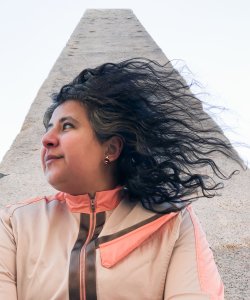Love Poems in Quarantine
“To love a body not because it’s perfect but because it shelters you.” Watch this series of microfilms directed by Melissa Crespo featuring poems from Love Poems in Quarantine by Sarah Ruhl (Copper Canyon Press, 2022).
Jump to navigation Skip to content
“To love a body not because it’s perfect but because it shelters you.” Watch this series of microfilms directed by Melissa Crespo featuring poems from Love Poems in Quarantine by Sarah Ruhl (Copper Canyon Press, 2022).
“[The poem] allows for a place for the reader to breathe,” says Ada Limón in this 2019 reading and conversation about her books of poetry with Washington Post book critic Ron Charles, hosted by the Library of Congress. “In that empty space we actually bring ourselves to the page, so that the writer is not the only person experiencing the poem, but the reader is part of that journey.”
“I’m just a series of words on pieces of paper.” In this interview with John Yau for the New York Foundation for the Arts, the poet and art critic speaks about his family, art, and cooking, which have all influenced his writing. Yau is the recipient of the 2018 Jackson Poetry Prize.
In Ada Limón’s poem “The Raincoat,” published in her collection The Carrying (Milkweed Editions, 2018), the speaker reflects on the experience of comfort and protection parents can offer through simple gestures like taking off a raincoat in a storm to wrap around their child or making time to drive and accompany them to doctor’s appointments. Write a poem about a time a parental figure of yours made a loving sacrifice. Think of a memory that makes you feel the way Limón does at the end of her poem: “My god, / I thought, my whole life I’ve been under her / raincoat thinking it was somehow a marvel / that I never got wet.”
This reading hosted by the University of Arizona Poetry Center presents the work of Marcelo Hernandez Castillo, author most recently of Children of the Land (Harper, 2020), and Marwal Helal, author most recently of Ante body (Nightboat Books, 2022), which is featured in Page One in the May/June issue of Poets & Writers Magazine.
Submissions are still open for the annual Gaudy Boy Poetry Book Prize! Offered for an “original Anglophone” poetry collection by a writer of Asian heritage living anywhere in the world, this award includes an increased monetary prize of $1,500 and publication by Gaudy Boy in the United States and Singapore. Emerging and established poets are eligible to apply.
To submit, e-mail a manuscript of 70 to 120 pages written in English and a short cover letter with a $10 entry fee by May 15. Yeow Kai Chai will judge. Visit the website for complete guidelines.
An imprint of the New York City–based literary nonprofit Singapore Unbound, Gaudy Boy publishes poetry, fiction, and nonfiction “of extraordinary merit by Asian voices.” The name Gaudy Boy comes from both a poem entitled “Gaudy Turnout” by Singaporean poet Arthur Yap and the Latin word gaudium, meaning “joy”; the press aims to “delight [their] readers with the various powers of art.” In August five finalists for their Poetry Book Prize will be announced and invited to participate in a September reading, where the winner will be announced. The prizewinning manuscript will be published in spring 2023. Previous winners include Lawrence Lacambra Ypil for The Experiment of the Tropics, Jenifer Sang Eun Park for Autobiography of Horse, and Paula Mendoza for Play for Time. An imprint of the New York City–based literary nonprofit Singapore Unbound, Gaudy Boy publishes poetry, fiction, and nonfiction “of extraordinary merit by Asian voices.” The name Gaudy Boy comes from both a poem entitled “Gaudy Turnout” by Singaporean poet Arthur Yap and the Latin word gaudium, meaning “joy”; the press aims to “delight [their] readers with the various powers of art.” In August five finalists for their Poetry Book Prize will be announced and invited to participate in a September reading, where the winner will be announced. The prizewinning manuscript will be published in spring 2023. Previous winners include Lawrence Lacambra Ypil for The Experiment of the Tropics, Jenifer Sang Eun Park for Autobiography of Horse, and Paula Mendoza for Play for Time.
Hope Wabuke celebrates the book launch for her debut poetry collection, The Body Family (Haymarket Books, 2022), with special guests Safia Elhillo and Ladan Osman in this virtual reading and conversation moderated by Aricka Foreman. Wabuke is featured in Literary MagNet in the May/June issue of Poets & Writers Magazine.
“dear existential fallacy, // i need you to be concrete. / you need me to liquidate / my account.” In this 2017 event at the Hammer Museum in Los Angeles, Evie Shockley reads from her collections the new black (Wesleyan University Press, 2012) and semiautomatic (Wesleyan University Press, 2017), a finalist for the 2018 Pulitzer Prize.
In a recent installment of Ten Questions, poet Dana Levin recalls the earliest memory associated with her new book, Now Do You Know Where You Are (Copper Canyon Press, 2022): “Pacing around my sublet in Saint Louis, Fall 2015, saying out loud the words ‘No,’ ‘Yes,’ and ‘Stop’ over and over: to feel how they felt in my mouth, my throat, my chest.” Included in Levin’s collection are three poems—“No,” “Maybe,” and “Into the Next Eden”—that seek to answer the question posed by the book’s title. This week, consider a question to ask yourself and write three poems with different responses. Do your answers surprise you?

“This book has its own life force. All you have to do is allow it to come together.” —Marwa Helal, author of Ante body